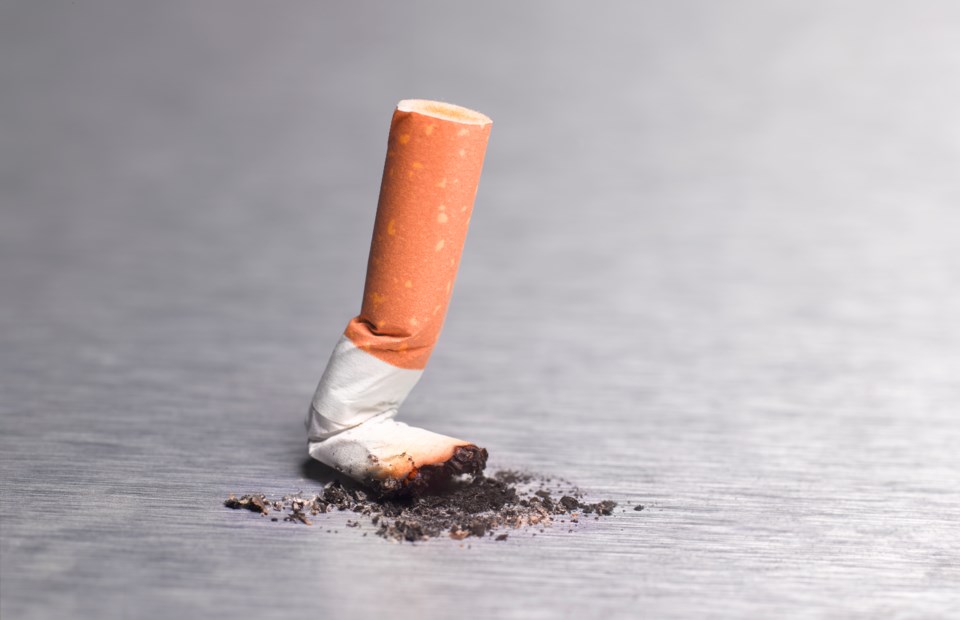High cigarette prices in B.C. are prompting residents to increasingly buy contraband tobacco products on the black market, according to industry research.
Those sales fund organized crime, thereby endangering society, Eric Gagnon, Imperial Tobacco Canada's vice-president of legal and external affairs told BIV.
They also cut into government revenue.
The B.C. government had been expecting $760 million in tax revenue from tobacco sales in the 2022-2023 fiscal year. It then reduced that expectation by $45 million, to $715 million of the fiscal year.
"Based on the current statistics on leakage to the illegal market, there is an annual tax loss of approximately $275 million for the B.C. government in 2022, and a loss of approximately $126 million in tax revenue for the federal government in 2022," Gagnon said.
He would like the B.C. government to stop raising tobacco taxes and create a dedicated task force to investigate the phenomenon.
Gagnon is also urging the province to pass a law that resembles one in Quebec, which enables police to search vehicles presumed to be carrying contraband tobacco even if the illegal products are not visible.
B.C. has the highest cigarette prices in the country, at $178 per carton, Gagnon said. That towers over the $162 per carton in Atlantic Canada, $162 in Manitoba and $160 in Saskatchewan.
Gagnon said some illegal cigarettes can sell for as little as $45 per carton.
"Over the last four years, the B.C. government has increased tobacco taxation by 44 per cent," he said.
That includes a hike in prices on July 1, when the province started requiring tobacco retailers to charge provincial sales tax on those sales.
"There's no appetite for anybody to roll back excise taxes on tobacco," Gagnon said. "We know that. So we're not even advocating for it. But, what we know is that if you have a dedicated task force to address the issue, and if you invest in this, working with law enforcement, you can reduce the impact of the illicit trade in your province."
B.C.'s Ministry of Finance sent BIV a statement to stress that it takes the matter of contraband tobacco sales seriously.
It said that it has a dedicated criminal investigations unit that works closely with all municipal police forces, the Royal 91原创 Mounted Police, Canada Revenue Agency, Canada Border Services Agency and other law-enforcement agencies.
In the 2021-22 fiscal year, that unit seized 3.6 million grams of illegal tobacco, the Ministry of Finance said, adding that between April 1 and June 30, the unit seized an additional 2.7 million grams of illegal tobacco.
"Work includes a designated retail tobacco inspection program that helps prevent the sale of contraband products in retail outlets," the ministry said. "We also participate in the federal and provincial tobacco stamping program that offers improved security features and markings. This makes counterfeit tobacco products more difficult to produce and easier to identity."
First Nations people living on reserves are exempt from paying tax on tobacco products. Products intended for tax-exempt sales to First Nations people must have a peach-coloured stamp from the federal government.
Tobacco intended for general sale in B.C. must have a green stamp from the province that says that the product has had duty paid.
Gagnon said he believes that much of the contraband product is made on First Nations reserves in Ontario and Quebec and is then transported by truck to B.C.
A B.C. government that buying and selling illegal tobacco is a crime that comes with fines of three times the tobacco tax, up to $50,000, two years imprisonment and forfeiture of the tobacco products and any licence to sell tobacco products that the seller may have.
Gagnon said his statistics show sales of legal cigarettes in B.C. are down by about 20 per cent in the first nine months of 2022, compared with the same time period last year.
He estimated that cigarette sales normally decline by about six per cent per year, and that a 20-per-cent decline is "way too much" to be because people are quitting smoking or cutting back their purchases.
Instead, he said industry statistics and research from Abacus Data estimate illegal tobacco sales in B.C. are between 30 per cent and 35 per cent of overall sales.
Indeed, there are plenty of listings for tobacco products on sites such as Craigslist, with many sellers saying that the products are from duty-free stores.
Last month, BC Crime Stoppers launched a province-wide awareness campaign to warn residents of the consequences of buying contraband tobacco.


